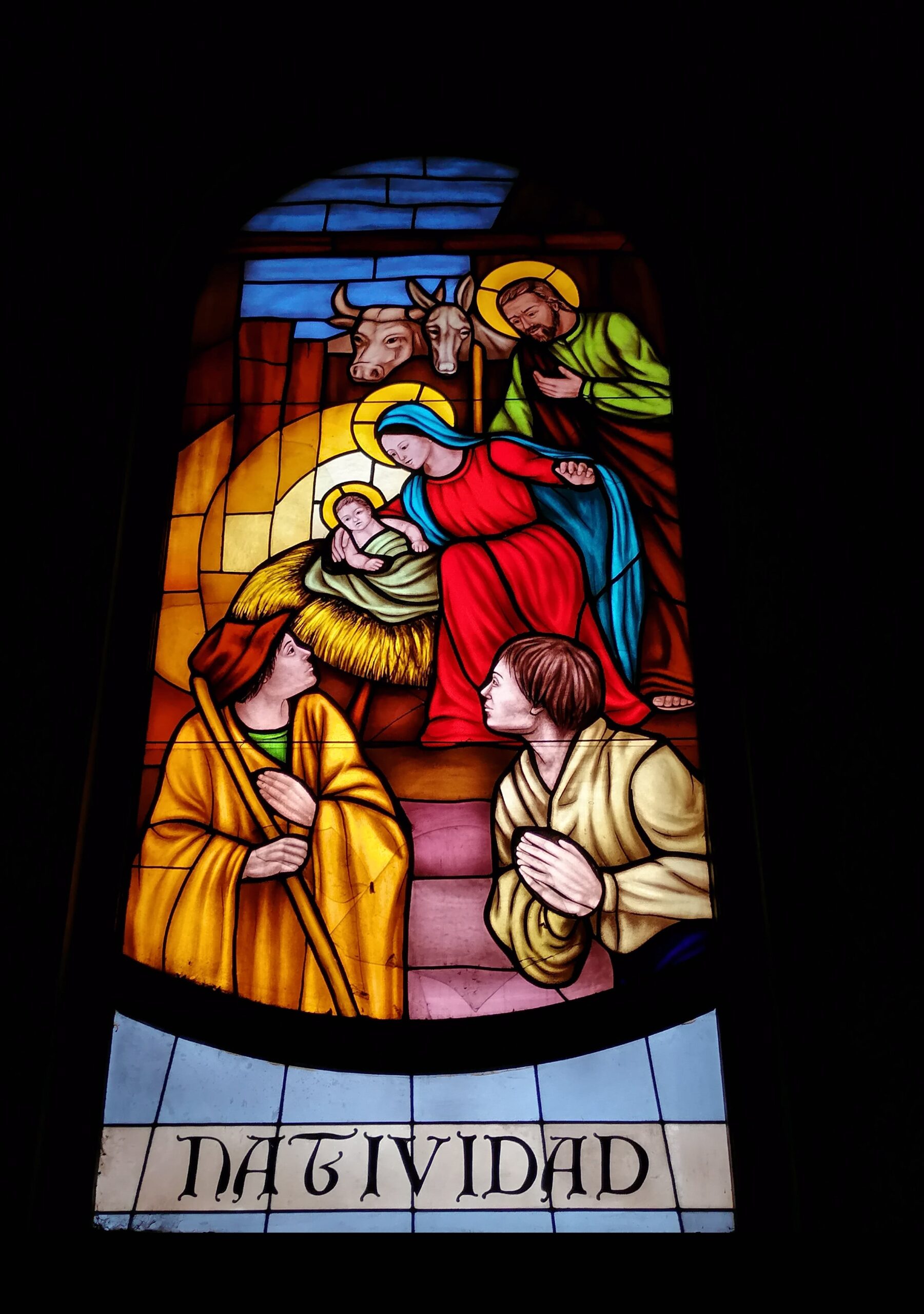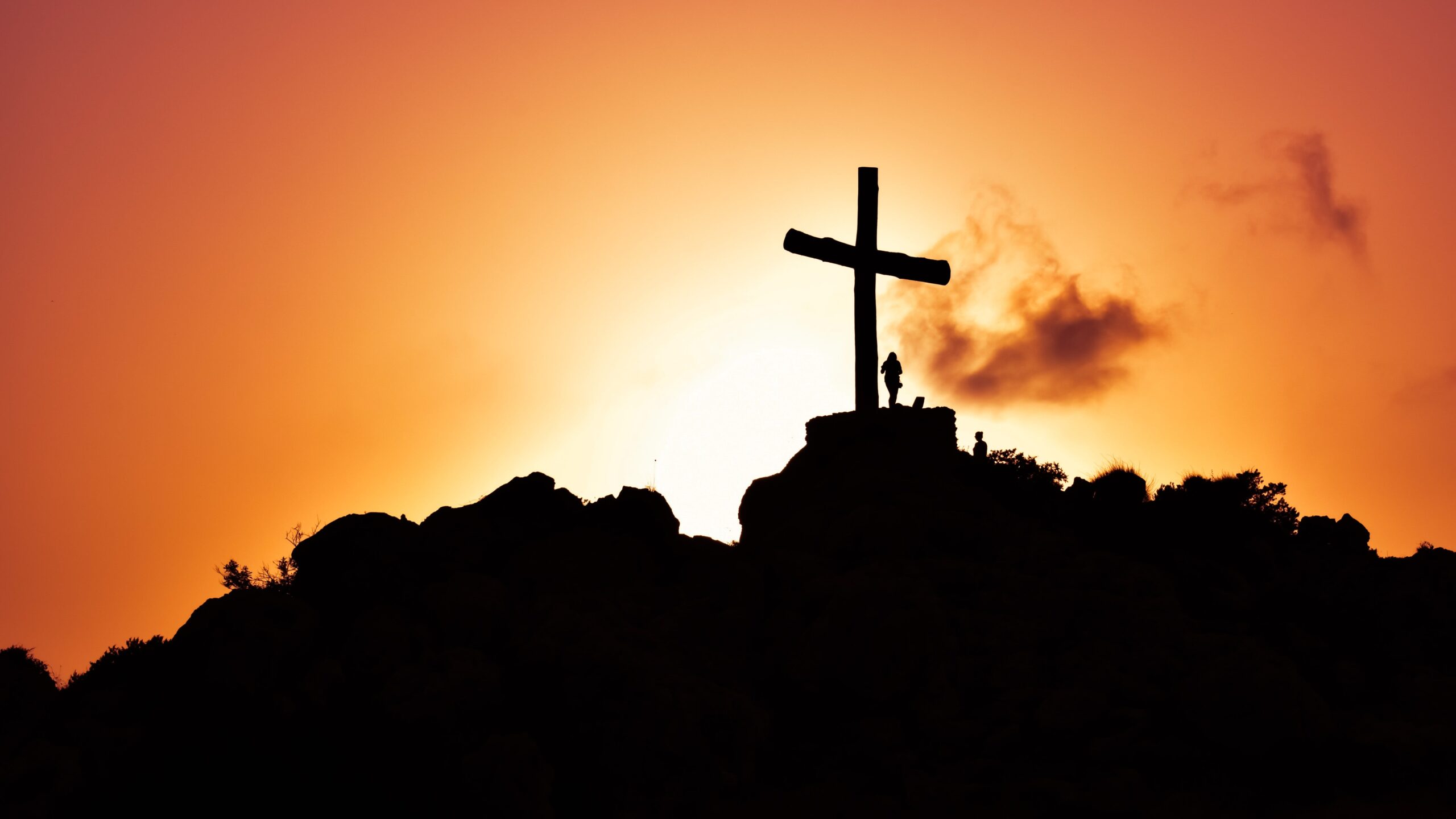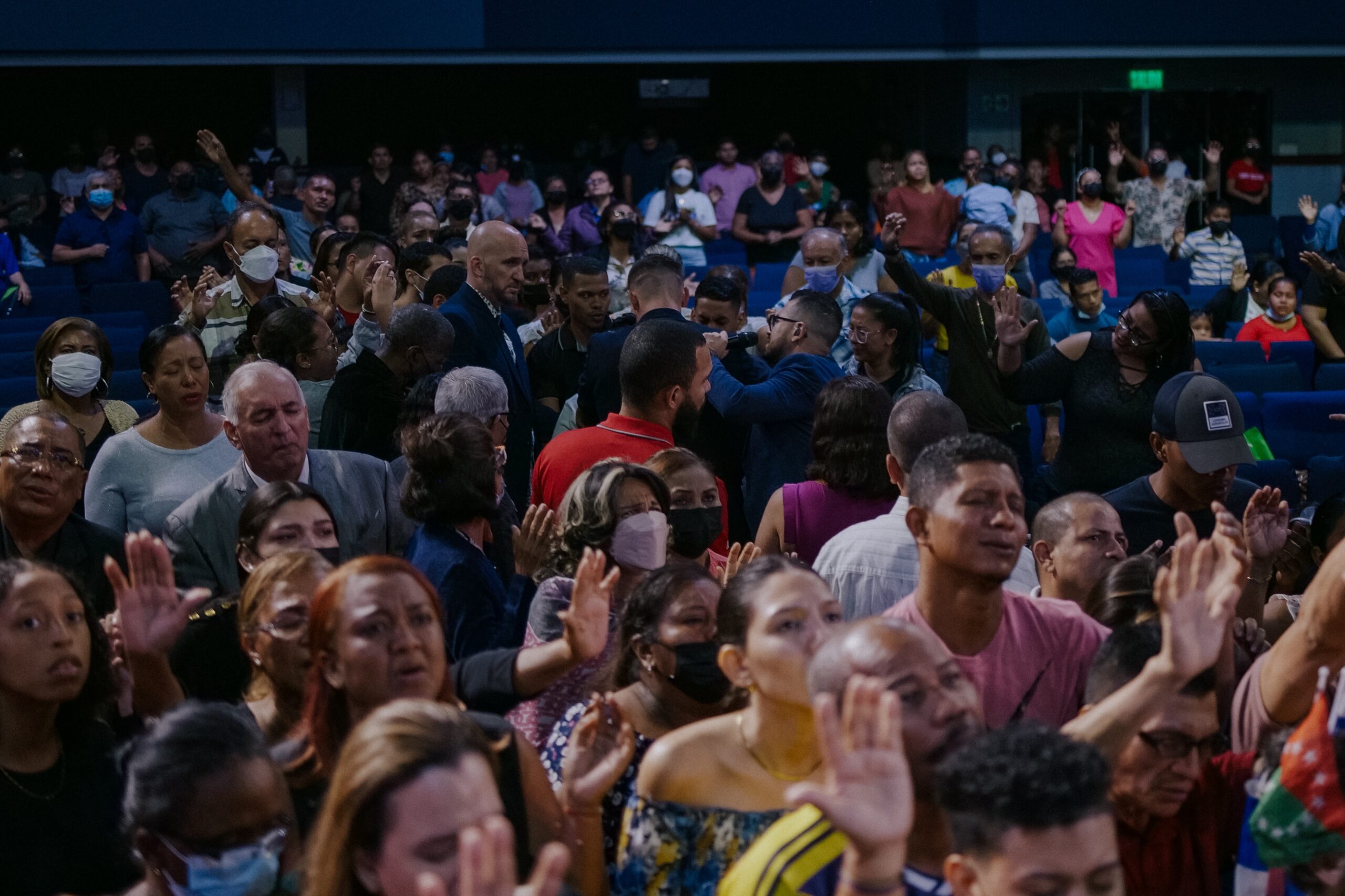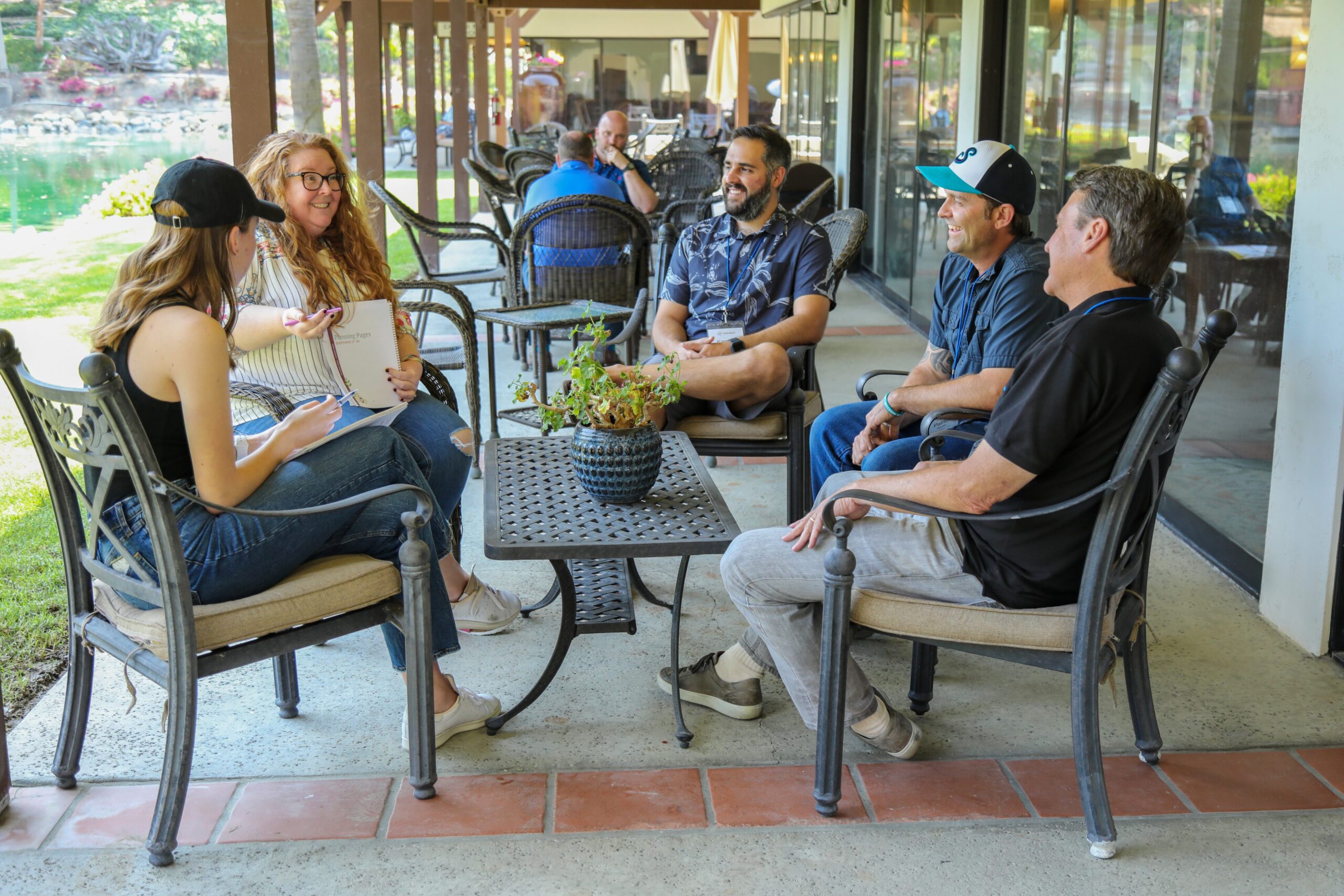THE CONNECTION
01
Dec '23

December 2023 Connection
Posted on Dec 1, 2023 in BLOG, Newsletter |
01
Dec '23

“Sing”
In 2005, I joined the Mount Union College Concert Choir as a freshman tenor. In our first week of rehearsal I learned an expectation of our choir that I grew to become most grateful for. Initially, however, I was shocked and terrified. By the end of our semester, in preparation for concerts and our annual January tour, all of our music had to be memorized. On the one hand, it felt about as possible as memorizing the phonebook. On the other hand, it made our sound as a choir, our trust in one another, and our confidence in ourselves all the greater!
Today, I happened upon a recording of a piece we sang for our 2005 winter concert. I hadn’t heard it in nearly 20 years and yet, as it played, I began to sing along with the 2nd tenors as if I’d memorized it yesterday. It’s remarkable what our memories are capable of, isn’t it?! And even as we age, and our memories struggle more and more to remember as they used to, the capacity and ability of our minds is astounding.
Looking back, I owe this experience to the expectation that our repertoire be entirely memorized. To do that required studying the scores again and again, attending sectional practices, preparing for weekly memory checks (nothing says, “Happy Friday!” like weekly tests), and pure determination. In other words, it took rehearsing the same thing over and over until it became muscle (or rather, voice) memory.
As you’re reading this, I suspect you’ve heard the nativity story before – you know, those passages from Matthew and Luke that tell us about Jesus’ birth in the town of Bethlehem. You’ve probably sang, or at least have heard the hymns “Away In A Manger” and “Silent Night.” Odds are also good that, if asked to draw a nativity scene, you’d probably be able to capture at least half of it correctly! And if all of this provides echoes of Luke chapter 2 being read by Linus and the rest of the Peanuts crew, reminding everyone about the true meaning of Christmas, well, there’s a reason for that. It’s been rehearsed in
your mind – in your faith – for a long time.
your mind – in your faith – for a long time.
We sing the hymns, we tell the stories, we build the nativity scenes, we light the candles, and so much more, not simply because it’s all pretty and nostalgic. We do it because that’s how we rehearse it! And because we rehearse it, as if by osmosis, the story of God’s incarnated love in the form of a
child becomes part of our heart-language.
child becomes part of our heart-language.
But we’re not done yet. Because knowing the story – knowing the song – only helps if we have the occasion to tell that story – sing the song. This Christmas, I want to encourage you to leave the rehearsal studio and find an occasion to sing the song. Find a moment – perhaps even with an unexpecting
shepherd – and share the story. And in doing so, may we discover Christmas.
shepherd – and share the story. And in doing so, may we discover Christmas.
With Peace, Hope, Joy & Love,
Pastor Brian
Pastor Brian
p.s. For anyone wondering, the piece of choral music I wrote about is titled “Almighty and Most Merciful Father.” The arrangement that we sang was composed by William Henry Harris. If you’d like to hear a recording, please click on the link here.
Read more...
01
Nov '23

November 2023 Connection
Posted on Nov 1, 2023 in BLOG, Newsletter, Uncategorized |
01
Nov '23

“Thud”
After this I saw another angel coming down from heaven. He had great authority, and the earth was filled with light because of his glory. He called out with a loud voice, saying, “Fallen, fallen is Babylon the great! -Revelation 18:1-2 (CEB)
I often find that people get nervous around the Book of Revelation. It’s almost as if just the mention of the title puts people on edge. It’s often associated with doom-and-gloom, “end times,” “rapture” (we’ll get to this one in a minute) and other such things. The Book of Revelation is like the dishes on Thanksgiving.
Everyone knows it’s coming, but no one wants to deal with it.
Everyone knows it’s coming, but no one wants to deal with it.
Did I mention its one of my favorite books of the Bible?! It actually is! I love the Book of Revelation, and not at all because of the things it’s so often associated with (see above).
Let’s start with doom-and-gloom. The style of literature with which the Book of Revelation is written is called “Apocalyptic Literature.” While I know that name, too, sounds scary, it’s just a style, much like poetry or allegory are styles of writing. Apocalyptic literature is most known for being dramatic, written in
narrative form (reads like a story), and presents present circumstances as doom-and-gloom, and then presents a final day as an outcome. This is a style used pretty broadly in ancient literature, not just in Revelation. Also, none of this is intended to say that apocalyptic literature is intended to be understood
literally. Similarly, consider the Tortoise and the Hare. It’s intended to be understood as a fable (another style of writing), and not a factual account of a rabbit and turtle running cross country. So, don’t be scared by the doom-and gloom! It’s just the style of writing. It’s not meant to freak anyone out.
narrative form (reads like a story), and presents present circumstances as doom-and-gloom, and then presents a final day as an outcome. This is a style used pretty broadly in ancient literature, not just in Revelation. Also, none of this is intended to say that apocalyptic literature is intended to be understood
literally. Similarly, consider the Tortoise and the Hare. It’s intended to be understood as a fable (another style of writing), and not a factual account of a rabbit and turtle running cross country. So, don’t be scared by the doom-and gloom! It’s just the style of writing. It’s not meant to freak anyone out.
How about the “end times” stuff, though? Again, it’s all part of the style. It’s not intended to predict a day on the calendar when some cosmic or geopolitical events will bring the world to an end. Those images and descriptions are just part of the doom-and-gloom style that is apocalyptic literature! The Book of Revelation was never intended to be a user’s manual for predicting the end of the world or anything like that. Its intent is actually far more intriguing.
But before I get to that (I know! Cliffhanger, right?!), let me address that thing called the “rapture.” If you’ve heard of it before – either from a book series that I don’t really recommend, from a social media post, or from your neighbor with a lot of ideas to share – you know that it’s a theory that teaches that one day, evil (Satan) will get its ultimate grasp on the world and all its people, and that God will take all true Christian believers to heaven, leaving behind everyone else, not to mention the clothes of those who have seemingly vanished, to experience the days of tribulation that are to follow. (deep breath.)
Sounds scary, eh? Well, let me put you at ease. Rapture theory is NOT a theory that United Methodists hold to, nor is it sound theology. And before you get worried that I’m denouncing core Christian beliefs, let me reassure you that “rapture” theory has only been around since the early 1800’s, and was espoused with the hopes of converting non-Christians into believers. You know, “if we scare them, they might convert!” While it may have worked to some degree, it did a great disservice to the Book of Revelation and the reputation of apocalyptic literature (and Christianity, while we’re at it).
So, what is the Book of Revelation really about, then? This is the intriguing part! It’s the story,
written in the apocalyptic style, of John receiving a revelation from the risen Christ that reminds him
of what the present world is like (difficult circumstances, to say the least), and assures him that, that
which is not of God and Love (referred to as Babylon) does not win in the end! God wins in the end!
It’s in that moment of the narrative that we hear the words you read at the beginning: “Fallen, fallen
is Babylon the great!”
of what the present world is like (difficult circumstances, to say the least), and assures him that, that
which is not of God and Love (referred to as Babylon) does not win in the end! God wins in the end!
It’s in that moment of the narrative that we hear the words you read at the beginning: “Fallen, fallen
is Babylon the great!”
Now, this might be the most simplistic one-paragraph description of the Book of Revelation (it really
deserves it’s own sermon series…hmmm). But, why do I like the book so much? It’s because the
pages are alive with proclamations of resurrection, new possibilities, new life, restoration, and
goodness! It’s a reminder to me that, no matter what we face in this world (and we certainly face
some challenging things), God has already overcome it! No matter what “Babylons” we face in life –
that which is not of God and Love – whether we face them personally or communally, God has and
will again, cause Babylon to fall!
deserves it’s own sermon series…hmmm). But, why do I like the book so much? It’s because the
pages are alive with proclamations of resurrection, new possibilities, new life, restoration, and
goodness! It’s a reminder to me that, no matter what we face in this world (and we certainly face
some challenging things), God has already overcome it! No matter what “Babylons” we face in life –
that which is not of God and Love – whether we face them personally or communally, God has and
will again, cause Babylon to fall!
There are times when the world around us feels like it’s crumbling. It’s in those moments that the
King of all kings, the Lord of all lords, and the Prince of Peace invites us to hear the thud of that
which is evil, hate, violence, hurt, division, and strife.
King of all kings, the Lord of all lords, and the Prince of Peace invites us to hear the thud of that
which is evil, hate, violence, hurt, division, and strife.
Say it with me: “Fallen! Fallen is Babylon!”
And so, we give thanks!
Pastor Brian
Pastor Brian
Read more...
01
Oct '23

October 2023 Connection
Posted on Oct 1, 2023 in BLOG, Newsletter |
01
Oct '23

“Pull Up A Chair”
Then Levi threw a great banquet for Jesus in his home. A large number of tax collectors and others sat down to eat with them. The Pharisees and their legal experts grumbled against his disciples. They said, “Why do you eat and drink with tax collectors and sinners?” Jesus answered, “Healthy people don’t need a doctor, but sick people do. I didn’t come to call righteous people but sinners to change their hearts and lives.” Luke 5:29-32 (CEB)
The other day, I was watching a reality TV show (insert eye roll). You know, the kind of show that adds zero value to your life, but you can’t help but watch? Anyway, during this particular episode, the show’s participants were asked what time they’d like to have their lunch. Their response? 3 o’clock in the afternoon! When asked when they’d like to sit down for dinner (not yet eat, but just sit down, mind you), they replied, 10:30pm! Now, I’m all for enjoying your vacation and living life outside of the box, but lunch is at noon and dinner is between 5 and 6pm,right?!
Maybe you’re with me, or maybe you’re not.
And that’s kind of the point. I wonder what Levi’s banquet was like. Do you think it was catered? Buffet style? Family style? Maybe plated? What was the vegetarian option? How much wine was there? Was there enough for everyone? Oh, and how do you suppose the guests were invited? Maybe it was an invitation to the whole community! Or maybe it was just for certain hand-picked guests. Jesus seemed to have been the guest of honor, so do you think he got to weigh in on who came? Do you think they ate dinner on time, or was it more like 10:30pm?
We don’t know the details, but the religious leaders certainly had some criticism for the party…for Jesus…maybe even for Levi – but most certainly for the party guests. “Why [does Jesus] eat and drink with tax collectors and sinners?” Now, to be fair, the Pharisees were not the only ones asking this question; I guarantee it! You see, how should I put this gently?
NO PERSON OF ANY RELIGIOUS AND SPIRITUAL INTEGRITY SPENT TIME WITH PEOPLE WHO WERE KNOWN TO BE SINNERS OR TAX COLLECTORS UNLESS ABSOLUTELY NECESSARY!
Jesus was doing that which no self-respecting rabbi would do…and I think he knew it. I suspect Jesus did it for two reasons. The first was simply because Jesus was showing absolute love for each person, all of whom he saw as a child of God. Why? Because no one is left out of the banquet – here or heavenly. The second reason I suspect Jesus did it was because he wanted to prove a point to everyone who questioned it. Just because what I’m doing has not been done before…just because it’s unfamiliar…just because its new…doesn’t make it wrong. It’s as if Jesus’ response is simple, “Just because it’s different doesn’t mean it’s not loving.”
In other words, just because I prefer my dinner at 6pm, doesn’t mean that there is anything wrong with eating dinner at 10:30pm, especially if that’s where the people who are hungry for love are. And so, if that means that we need to pull our chairs up to that late night table – no matter how different or out-of-our-comfort-zone it may be, our resounding response should simply be, “Let’s Eat!”
There’s another seat next to mine. You want it?
Pastor Brian
Read more...
01
Sep '23

September 2023 Connection
Posted on Sep 1, 2023 in BLOG, Newsletter |
01
Sep '23

“Pull Up A Chair”
“You have heard that it was said, You must love your neighbor and hate your enemy. But I say to you, love your enemies and pray for those who harass you…If you love only those who love you, what reward do you have? Don’t even the tax collectors do the same? And if you greet only your brothers and sisters, what more are you doing? Don’t even the Gentiles do the same? Therefore, just as your heavenly Father is complete in showing love to everyone, so also you must be complete.”
~Matthew 5:43-44, 46-48 (CEB)
“But in all these things we win a sweeping victory through the one who loved us. I’m convinced that nothing can separate us from God’s love in Christ Jesus our Lord: not death or life, not angels or rulers, not present things or future things, not powers or height or depth, or any other thing that is created.” ~ Romans 8:37-39 (CEB)
When my grandmother, Jane West, passed away in December 2006 at the age of 90, she left us with two requests for her funeral. The first was that we’d sing the hymn “O For a Thousand Tongues to Sing.” The second was a bit unorthodox, and that was that she demanded that we not serve Green Bean casserole at her funeral luncheon. Needless to say, it wasn’t her favorite! The problem was, for everyone else in the family, Green Bean Casserole was (and still is) a favorite. We wanted to bring to the table a dish that we loved, but simply wasn’t allowed. We honored that wish of hers…for the most part.
In the last year or so, I’ve been sharing a vision with this congregation that I pray we can live into what it means to be what I call a “Big Table Church.” Having shared this before, bear with me as I share it again with a bit more nuance. By a “Big Table Church,” what I am referring to is the idea that we gather at the figurative (and sometimes literal) table of the God, feasting on the goodness of God’s great love, and
experiencing what it means to be Christians and a people called the church. Jesus invites us to recognize that this table is not only BIG, but that it is also Growing. At this table where we gather as a church, we have to begin to recognize that what allows me to come to the table is God’s all-sufficient grace, which is also the very thing that brings you to the table.
experiencing what it means to be Christians and a people called the church. Jesus invites us to recognize that this table is not only BIG, but that it is also Growing. At this table where we gather as a church, we have to begin to recognize that what allows me to come to the table is God’s all-sufficient grace, which is also the very thing that brings you to the table.
You see, God’s table – the fellowship of believers – is not yours or mine. It is wholly God’s! And when it’s God’s table, and it is God’s grace that invites you and me to it, there can be no argument that it is not available for each and every one of God’s children! No exceptions, no small print, no asterisks. If there is space for me, then there is space for you. And if there is space for us, then there is absolutely space for
all! God’s grace and love knows no limit (Romans 8:37-39)!
all! God’s grace and love knows no limit (Romans 8:37-39)!
But, we can’t stop here, because this begins to sound like a table full of chaos! God’s kingdom is one of love, grace, hope, peace, joy, and inclusion, and so it would be reasonable to expect that the table would be, too. For this purpose, I like to say that the table is big and open to everyone, but the menu is God’s, too, and we don’t get to bring our own food. And that’s where the Green Bean Casserole comes in.
When we’re at God’s table, the meal that is served is love and love, alone! Another way to look at is to remember that the meal that is served at the big table is the gospel – a gospel of immense and unfailing love; a gospel of diminishing margins and the inclusion of, and love for those who have spent too long on those margins; a gospel that announces forgiveness and grace; a gospel that sets free and tears down barriers, not builds them; a gospel that commands our love to be more reflective of God’s love (Matthew 5:48).
For us to be a “Big Table Church” means that we’re going to work hard – and at times struggle – to
pull up chairs to the table to make sure that everyone has access to a seat. We’re not going to leave anyone out, determine litmus tests for who belongs, or leave anyone on the outside looking in. We’re not going to own the table, but instead recognize that it is, has always been, and will forever be GOD’S TABLE! For us to be a “Big Table Church,” it means that we’re going to feast on the incredible love of God and demand of ourselves and hold one another accountable to leave behind us all that is not of love.
pull up chairs to the table to make sure that everyone has access to a seat. We’re not going to leave anyone out, determine litmus tests for who belongs, or leave anyone on the outside looking in. We’re not going to own the table, but instead recognize that it is, has always been, and will forever be GOD’S TABLE! For us to be a “Big Table Church,” it means that we’re going to feast on the incredible love of God and demand of ourselves and hold one another accountable to leave behind us all that is not of love.
There is no question that this is going to be incredibly hard for all of us at various times! At moments
we’re going to forget whose table it is and we’re going fall short by thinking that we somehow deserve a seat at the table while others are still on the outside looking in. There are going to be days where we demand our Pyrex dish of Green Bean Casserole be allowed at the table, even though it just doesn’t belong. And while we will succeed again and again at being a “Big Table Church” that reflects God’s love, we must admit that this will likely be the most difficult thing we’ll ever do in our lives! But I promise you this: there is nothing in this world more worth this effort than the Kingdom of God!
we’re going to forget whose table it is and we’re going fall short by thinking that we somehow deserve a seat at the table while others are still on the outside looking in. There are going to be days where we demand our Pyrex dish of Green Bean Casserole be allowed at the table, even though it just doesn’t belong. And while we will succeed again and again at being a “Big Table Church” that reflects God’s love, we must admit that this will likely be the most difficult thing we’ll ever do in our lives! But I promise you this: there is nothing in this world more worth this effort than the Kingdom of God!
The truth is, we live in a world that is looking for a church that can be trusted. People of all ages are
looking for a church that not only talks about love, but actually loves; not only talks about grace, but also
extends it; not only exists for itself, but exists to that the world might come to know the goodness of God. In this season of Christianity, the world aches for an authentic expression of God’s very real love. We can be that! But it’s going to take each and every one of us.
looking for a church that not only talks about love, but actually loves; not only talks about grace, but also
extends it; not only exists for itself, but exists to that the world might come to know the goodness of God. In this season of Christianity, the world aches for an authentic expression of God’s very real love. We can be that! But it’s going to take each and every one of us.
Pull up a chair!
Pastor Brian
Read more...
31
Jul '23

August 2023 Connection
Posted on Jul 31, 2023 in BLOG, Newsletter |
31
Jul '23

Scooter-O’s
“Then those who are righteous will reply to him, ‘Lord, when did we see you hungry and feed you, or thirsty and give you a drink? When did we see you as a stranger and welcome you, or naked and give you clothes to wear? When did we see you sick or in prison and visit you?’ “Then the king will reply to
them, ‘I assure you that when you have done it for one of the least of these brothers and sisters of mine, you have done it for me.’ -Matthew 25:37-40 (CEB)
them, ‘I assure you that when you have done it for one of the least of these brothers and sisters of mine, you have done it for me.’ -Matthew 25:37-40 (CEB)
I’d never heard of Scooter-O’s before, but there they were in the “Community Closet,” a small cupboard in the basement kitchenette below my Intro to New Testament and Homiletics classrooms in DeWire Hall at Methodist Theological School in Ohio. The “Community Closet” wasn’t a very large cupboard, with its
doors a bit sticky from years of build-up and not much attention. The food items inside were a bit questionable in terms of their expiration date, but there they were; food items available for anyone in need to take. It was the seminary’s version of a food bank. And sitting between a couple of cans of
green beans and some form of bean with the label half torn off was a giant bag of off-brand Cheerios with about a month to spare on the expiration label. Looking around on a Saturday morning, I took them, went to my apartment, and had what I convinced myself was a fairly decent breakfast.
doors a bit sticky from years of build-up and not much attention. The food items inside were a bit questionable in terms of their expiration date, but there they were; food items available for anyone in need to take. It was the seminary’s version of a food bank. And sitting between a couple of cans of
green beans and some form of bean with the label half torn off was a giant bag of off-brand Cheerios with about a month to spare on the expiration label. Looking around on a Saturday morning, I took them, went to my apartment, and had what I convinced myself was a fairly decent breakfast.
The background to the story is a lot longer than this article calls for, but the long and the short of it is that my pride kept me from reaching out for help. I wanted to believe I could do it alone. Were there those who would have helped me if I’d asked? Sure! But pride is a lonely thing.
I think about those Scooter-O’s often, and I’m immensely grateful for whoever it was that put them there in that sticky “Community Closet” cupboard. I think about that bag of cereal every time I have the chance to hand out a blessing bag from the church, or when I can help someone a bit out of the church’s
discretionary fund. For me, I do my best to help others who are in need, in part, because someone decided to put cereal in a cupboard in anticipation of a day when I’d be hungry and afraid to ask for help.
discretionary fund. For me, I do my best to help others who are in need, in part, because someone decided to put cereal in a cupboard in anticipation of a day when I’d be hungry and afraid to ask for help.
In Matthew’s Gospel, we find Jesus’ reminder to his disciples that each time they are helping others, they are helping the divine. Each time they are serving the hungry, the hurting, the naked, and the marginalized, they are – in a very real way – serving Christ.
When our neighbors ask for help, may we recognize the courage that may take. When we’re face to face with panhandling, may we recognize the pride that has been abandoned. When our neighbors ask for help, may we see in their faces the image of Christ. And when our neighbors are in need, may we
seek to remember moments in our lives when we were in need and found aid in the One we call Love and LORD.
seek to remember moments in our lives when we were in need and found aid in the One we call Love and LORD.
Pastor Brian
Read more...
01
Jul '23

July 2023 Connection
Posted on Jul 1, 2023 in BLOG, Newsletter |
01
Jul '23

Hanging in my office, just above my desk is a baseball jersey with my last name stitched between the shoulders, and the number 6 in the center. The number 6 was my choice, in the hopes of channeling the legendary Al Kaline. My name on it, however, was my dream come true. It’s also a reminder of the
day that I almost recorded an out against Hall of Fame player, and best designated hitter ever, Edgar Martine. . . almost.
day that I almost recorded an out against Hall of Fame player, and best designated hitter ever, Edgar Martine. . . almost.
While I was in seminary a good friend of mine, Tim Wisecup, happened to win a contest put on by Pepsi called “Pepsi Max Field of Dreams.” As the contest winner, Tim was allowed to put together a team of 10 of his friends to play a baseball game in front of 15,000. Our opponents? Hall of Fame professional
baseball players.
baseball players.
That night in May, 2012, I got to bat against Boston Red Sox pitcher, Pedro Martinez. I got to stand at first base with The Big Hurt himself, Frank Thomas. I even got heckled by the greatest catcher of all time, Johnny Bench. As a baseball fan, it really was a childhood dream come true!
Then, in the first inning, with the Kaline #6 on my back, I took my position at Right Field. Stepping up to the plate was designated hitter, Edgar Martinez – again, one of the best. As luck would have it, the first pitch met his bat, and the ball sailed out into Right Field. I suddenly became aware that I was the only
one out there. It was my ball to catch and my time to shine! With all eyes on this 6’8” tee-ball experienced baseball fraud, I ran backwards, lifted up my glove, and…completely missed it. The ball fell to the ground and rolled on the grass. As I threw the ball into the infield, I heard someone yell from the stands, “Come on, West! How could you miss that?!”
one out there. It was my ball to catch and my time to shine! With all eyes on this 6’8” tee-ball experienced baseball fraud, I ran backwards, lifted up my glove, and…completely missed it. The ball fell to the ground and rolled on the grass. As I threw the ball into the infield, I heard someone yell from the stands, “Come on, West! How could you miss that?!”
I tell this story to highlight something that was going through my head for the rest of that night – an existential question, really: Was this night my dream come true, or my most public failure? In other words, did I get to play out a childhood fantasy, or did I just make the biggest blunder of my life?
While this circumstance is a bit unusual, the question really isn’t that uncommon. We live our lives with successes and celebrations all over the place. Sometimes, they’re big moments of success, but more often than not, they’re mini, and so we hardly notice them. For instance, you got out of bed this morning! That’s a success. You managed to smile at your coworker! Great job. You got to spend time with family and friends. Awesome. You get the point. Life is full of wins…all the time! The problem is, we are really good at fixating on that one thing that didn’t go so great.
In other words, we find ourselves on a baseball field, living our best lives – full of joy and gladness – but all we can remember is our shortcoming.
My invitation to you today is this: acknowledge when you drop the ball. But, also take time to look at the beautiful field on which you stand. God’s grace, love, and forgiveness wants you to enjoy the game, and not linger on the missed ball.
Peace,
Pastor Brian (#6)
Pastor Brian (#6)
Read more...
26
May '23

June 2023 Connection
Posted on May 26, 2023 in BLOG, Uncategorized |
26
May '23

A church that worships together — thrives together —
grows together!
At the beginning of this year, the Worship and Arts Team here at GBUMC set some goals around worship, including one around worship attendance: to see in-person worship attendance at GBUMC increase by 10% throughout the year. This goal was based on a few contributing considerations:
1. We have the people to make this happen! In other words, even without visitors flocking to GBUMC, this goal is more than attainable.
2. While worship attendance doesn’t necessarily make someone a Christian, we do strongly believe that regular worship attendance does have a direct relationship to our spiritual health, our relationships with Christ. Certainly, this is something we want to encourage.
3. Our online streaming of both worship services continues to be used by members of our church family who are unable to come for one reason or another. Virtual worship, while it has its limitations, still allows individuals to experience and participate in worship with us. It also continues to be a meaningful outreach tool as it provides a safe “first visit” for folks looking for a church home. For these reasons and more, we’ll continue to provide this virtual ministry. Our efforts to encourage in-person worship is not opposed to a virtual worship ministry.
In the last few months, the Worship and Arts Team has begun a few efforts to help encourage regular worship attendance such as our church text messaging service which about 60 people have signed up for. Through weekly texts, it is our hope that we can remind and encourage GBUMC’ers to make Sunday worship part of, what can often be, a busy schedule.
Now, as you read this, I want to be perfectly clear: This is NOT a guilt trip from your Pastor. This is not intended to make anyone feel like their uncommitted, or anything like that. Instead, I want it to be an invitation from your pastor to help your church grow: grow in size, grow in spiritual health, grow in its outreach and service. You see, when you are here with us in worship – when your loved ones, children, friends, etc. are here with us in worship – you become stronger in your faith and walk with God. And in turn, as the Body of Christ, we grow stronger and we grow as a family.
As I’m writing this, I am optimistic that we’ll meet our goal of 10% growth in in-person worship. Not because we’ve made people feel guilty (I hope that’s not the case), but because we all become part of a church-family effort to grow. I hope you’ll join me!
See you on Sunday!
Pastor Brian
Pastor Brian
Read more...
01
May '23

May 2023 Connection
Posted on May 1, 2023 in BLOG, Newsletter |
01
May '23

“Not Complicated, Not Easy”
A Call to Real Discipleship
“Teacher, what is the greatest commandment in the Law?” He replied, “You must love the Lord your God with all your heart, with all your being, and with all your mind. This is the first and greatest commandment. And the second is like it: You must love your neighbor as you love yourself. All the Law and the Prophets depend on these two commands.” -Matthew 22:36-40 (CEB)
In a sermon not too long ago, I made the comment that “being a Christian isn’t easy, and if anyone ever tells you that it is, they’re either lying to you, or they’re not really trying that hard.” Afterward, during a lovely conversation, someone shared with me their reflection on that idea. They said something to
the affect of, “Being a Christian really isn’t that hard, though. Just love people!” I nodded in response, agreeing that “just love people” is a pretty fair summary of Jesus’ teachings. But I also took time to add this: Being a Christian is not a complicated thing, but that doesn’t make it easy.
the affect of, “Being a Christian really isn’t that hard, though. Just love people!” I nodded in response, agreeing that “just love people” is a pretty fair summary of Jesus’ teachings. But I also took time to add this: Being a Christian is not a complicated thing, but that doesn’t make it easy.
When we read Jesus’ response to the question in Matthew’s Gospel of “What is the greatest commandment in the Law,” we find ourselves marveling at just how simple it really is. It’s not overly complicated! There are no footnotes, small print, or hastily read lines at the end of his announcement like when we see commercials advertising the latest pharmaceutical. Jesus lays it out simply for us: Love God wholly! Love neighbor! Love yourself! Jesus even goes on to say (and I paraphrase), “and this about wraps it up!”
You see what I mean? Being a Christian and following the greatest commandment is not complicated. In fact, you probably have it memorized already (if you don’t it’s a good passage of scripture to memorize). But somehow, as Christians in the 21st century (and I would argue this really started centuries ago), we’ve conflated the idea of Christianity’s simplicity with an ease of discipleship. Herein lies the problem…It’s not always easy – in fact, it’s rarely easy – to be a Christian.
To be a Christian – to love God, neighbor, and self – means that we stand up for those who are forgotten. In a world and culture that often leaves people at the margins (and in some instances, pushes), to be a Christian means that we need to speak out against powers, policies, and practices that would leave the
margins as they are.
margins as they are.
To be a Christian – to love God, neighbor, and self – means that we advocate for peace and community wellbeing amid a culture that encourages fear of “the other.”
To be a Christian – to love God, neighbor, and self – means that we draw the circle wider, not smaller. It means that we define ourselves by the ever growing size of our table, and not by rules that would dictate who gets to sit at it. It means that no one is forgotten, ignored, or kept at arm’s length.
We could go on and on, but I’ll leave it at this: Being a Christian requires nothing less of us than using
Jesus’ greatest commandment as a litmus test for what is good and right. Does it love God? Does it
love the neighbor? Is it loving ourselves? It’s not complicated, but that doesn’t mean it’s always easy.
And so, may we journey as Christian disciples together! May we encourage one another to love in a
way that is oftentimes challenging! May we remind one another of what Christ’s love looks like, so
often that we can’t help but reflect it, too! May we seek to be a church that embodies the love, grace,
and joy of Christ in this world…this community.
Jesus’ greatest commandment as a litmus test for what is good and right. Does it love God? Does it
love the neighbor? Is it loving ourselves? It’s not complicated, but that doesn’t mean it’s always easy.
And so, may we journey as Christian disciples together! May we encourage one another to love in a
way that is oftentimes challenging! May we remind one another of what Christ’s love looks like, so
often that we can’t help but reflect it, too! May we seek to be a church that embodies the love, grace,
and joy of Christ in this world…this community.
May we love.
Pastor Brian
Pastor Brian
Read more...